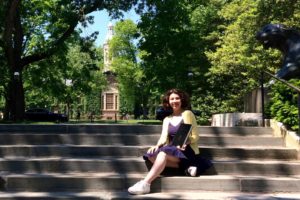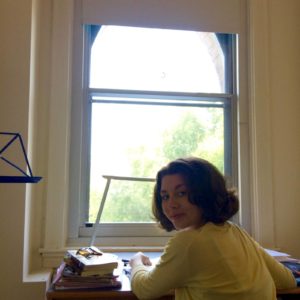In our spring series, Senior Theses: A Celebration, we take a moment in the interlude between thesis deadlines and graduation to appreciate the diverse, personal, and impactful work of seniors’ capstone research projects.
~~~~~~
Claire Ashmead completed two theses this spring: for her History concentration, a comparative study of McCarthyism and the Chinese Cultural Revolution, and, for her Creative Writing certificate, a novella entitled The Camel-Hair Coat. Here she reflects on writing and revising, family and loss, and the completion of her first book.

What is your novella, The Camel-Hair Coat, about?
It follows a girl, Daphne, who, four years ago, under mysterious circumstances, lost her mother in a terrible accident. Her intense grief over her mother’s death and profound yearning to know why her mother was taken away from her summons the ghost of her mother back from the dead. Daphne is faced with this choice: she can bring her mother back to reality, which she has wanted more desperately than she’s ever wanted anything before, but with terrible consequences for the rest of her family – her sister and grandmother. The price of bringing somebody back might be the exchange of other people you love, and even yourself. But if you really miss somebody – what wouldn’t you do?
How would you distill the book’s themes into a few words?
Grief, wishes, and growing up.
What was the hardest part of writing the book?
How much I had to revise. The book underwent a dramatic transformation, in part because I had two advisers: Joyce Carol Oates in the fall and then Jeffrey Eugenides in the spring. They’re completely different writers, which for me I think ended up being great: Joyce Carol Oates really tries to pull your creativity out of you, and she encouraged me to envision an alternative reality that ended up being a little confusing. Jeffrey Eugenides, on the other hand, is a very linear storyteller. When I gave him my draft, he told me he didn’t really understand what was going on, and that I needed to rewrite.
It was February, and I was hearing from my adviser that the 140 pages I’d generated needed to go. But in another sense that actually felt great.
At first that was very scary. It was February, and I was hearing from my adviser that the 140 pages I’d generated needed to go. But in another sense that actually felt great. I’d had the sneaking suspicion that the story needed a major change, and I wasn’t sure in what way. So I decided to structure it like a four-act play, where each act takes place in one day of one season. Once I had that structure, it was like, bingo! I know how this is going to develop.
In the second writing, I only kept maybe 3% of the words I’d previously written. But because I’d already created the spaces and characters in my head, writing the story the second time around actually took almost no effort, and required much less editing.
How did you juggle writing two separate theses?
It was all about time management. I also really believe that just getting words on a page is so crucial. Often people feel like writing needs to be perfect when it comes out onto the page. My experience writing for Princeton Triangle Club has taught me that actually the hardest part is just starting, and as soon as you begin to write, your thoughts become clearer.
Also, the processes of the two theses were very different, which was helpful – if they were the same it probably would’ve been much more difficult for me to do the two. For my creative thesis, I wrote almost every day. With creative writing, I want to explore characters and change dialogue, so the earlier I get it out, the better. In history, it’s a very different beast: I like getting all of my secondary source reading and research done, getting it all into my head, and then putting it out onto the page. I would research for months and months, and then sit down and write a chapter in a day or two.
Describe your happy place as a writer.
I have a two-room single in Edwards, so I have a room with my bed, and then another with a desk, facing the window. I wake up early, at 6 or 7 a.m., and would either go for a run or just go get coffee at Rojo’s, and then come to my desk in my little monastic sanctuary and write.

The first time I write something, I write in pen, by hand, on blank sheets of unlined paper. The great thing about writing by hand is that it’s physically exhausting, so you only say what you need to say, and the words you pick are more exact and intentional.
I’d sit down and write for about an hour and a half every morning, which would be about five double-spaced typed pages, sometimes more. The first sentence can sometimes be difficult, but as you start writing, you reenter the world. It’s like learning to ride a bike: you remember it, and you just push forward on the momentum of describing the scene.
The first sentence can sometimes be difficult, but as you start writing, you reenter the world. It’s like learning to ride a bike: you remember it, and you just push forward on the momentum of describing the scene.
Do you have a favorite section of the book?
A lot of the book was plot that I just had to get through, and then there were a few scenes that made me feel that they were exactly why I wrote the book. Here are two paragraphs, after Daphne’s mother has come back and she is able to speak with her mother again.
Her mother took her hands. “At least you’ll have your father to walk you down the aisle. Mine was gone by the time I was your age. I missed him so much.”
“What’s it like?” Daphne asked. “Missing somebody?”
“You know, I’ve never thought about it.” Her mother frowned. “I’d say missing somebody is like remembering to pick up milk at the grocery store. Most of the time, you don’t think about it at all. And then all of a sudden the thought will just occur to you. I’ve got to pick up milk at the grocery store. And the thought will occur to you once a week, every month, every year, for forever. I’ve got to pick up milk at the grocery store. There, that’s it. I think about my father every day.”
If you’d like to read more of The Camel-Hair Coat, you can find it archived – with all senior theses – on the senior thesis digital archive, where it will be available starting after graduation on June 6th, 2017.
— Zoe Sims, Natural Sciences Correspondent

